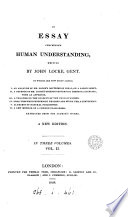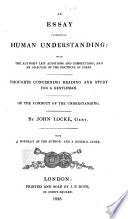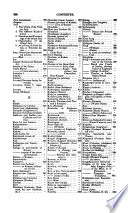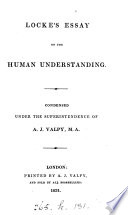 For if we will reflect on our own ways of thinking, we shall find that sometimes the mind perceives the agreement or disagreement of two ideas immediately by themselves, without the intervention of any other: and this, I think, we may call intuitive knowledge. For if we will reflect on our own ways of thinking, we shall find that sometimes the mind perceives the agreement or disagreement of two ideas immediately by themselves, without the intervention of any other: and this, I think, we may call intuitive knowledge.  An Essay Concerning Human Understanding - Page 61by John Locke - 1796 - 459 pagesFull view An Essay Concerning Human Understanding - Page 61by John Locke - 1796 - 459 pagesFull view - About this book
 | John Locke - 1828 - 436 pages
...sometimes the mind perceives the agreement or disagreement of two ideas immediately by themselves, without the intervention of any other : and this,...truth, as the eye doth light, only by being directed toward it. Thus the mind perceives, that white is not black, that a circle is not a triangle, that... | |
 | John Locke - Knowledge, Theory of - 1828 - 602 pages
...sometimes the mind perceives the agreement or disagreement of two ideas immediately by themselves, without the intervention of any other : and this,...intuitive knowledge. For in this, the mind is at no pains in proving or examining, but perceives the truth, as the eye, doth light, only by being directed towards... | |
 | Francis Lieber, Edward Wigglesworth, Thomas Gamaliel Bradford - Encyclopedias and dictionaries - 1831 - 620 pages
...intervention of any other ; in which case, the mind perceives the truth, as the eye does the light, merely by being directed towards it. Thus the mind perceives that white is not black, that three are more than two, and eqyal to one and two. This part of knowledge, says Locke, is irresistible,... | |
 | Ernst Reinhold - 1829 - 612 pages
...sometimes the mind perceives the agreement or disagreement of two ideas immedia tely by themselves, without the intervention of any other, and this, I think, we may call intuitive knowledge. \ , auf Ihren 3w«f bit Semonflrutfon ober bit lute IVroeiófúhruug, iinb fcic Ьигф pe gewonnene... | |
 | John Locke - 1831 - 458 pages
...any other, we may call it intuitive knowlege, in which cases the mind perceives truth as the eye does light, only by being directed towards it. Thus the mind perceives that white is not black, that three are more than two, and equal to one and two. This part of knowlege is irresistible, and, like... | |
 | English literature - 1831 - 536 pages
...any other, we may call it intuitive knowlege, in which cases the mind perceives truth as the eye does light, only by being directed towards it. Thus the mind perceives that white is not black, that three are more than two, and equal to one and two. This part of knowlege is irresistible, and, like... | |
 | Encyclopaedia Americana - 1831 - 608 pages
...intervention of any other ; in which case, the mind perceives the truth, as the eye does the light, merely by being directed towards it. Thus the mind perceives that white is not black, that three are more than two, and equal to one and two. This part of knowledge, says Locke, is irresistible,... | |
 | Francis Lieber, Edward Wigglesworth - Encyclopedias and dictionaries - 1838 - 618 pages
...intervention of any other ; in which case, the mind perceives the truth, as the eye does the light, merely by being directed towards it. Thus the mind perceives that white is not black, that three are more than two, and equal to one and two. This part of knowledge, says Locke, is irresistible,... | |
 | Encyclopedias and dictionaries - 1839 - 1000 pages
...disagreement of two ideas immediately by themselves, and this, I think, we may call intuitive knowledge. In this the mind is at no pains of proving or examining, but perceives the truth as the eye does the light, only by being directed to it.' (Essay on Human Understanding, b. iv., c. ii., § 1.)... | |
 | Society for the diffusion of useful knowledge - 1839 - 524 pages
...disagreement of two ideas immediately by themselves, and this, I think, we may call intuitive knowledge. In this the mind is at no pains of proving or examining, but perceives the truth as the eye does the light, only by being directed to it.' (Essay on Human Unilerstanding, b. iv., c. ii., } 1.)... | |
| |